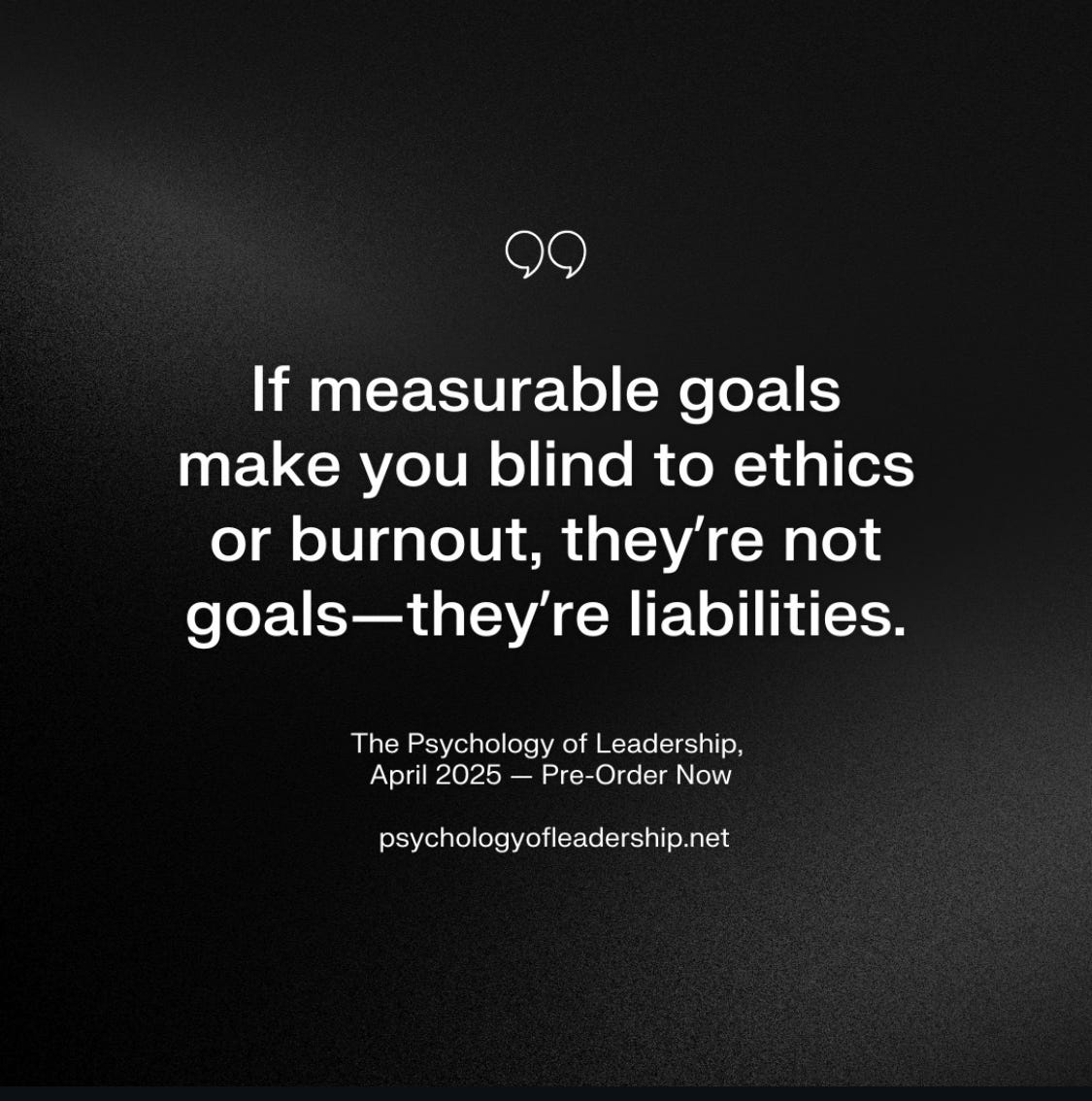Goal-induced blindness happens when you’re so obsessed with reaching a goal that you fail to see the negative consequences of your actions. An example of goal-induced blindness that is often cited in psychology literature are the deaths of climbers on Mt. Everest.
There are examples everywhere of highly motivated people who are “blinded by the goal” (cue the “blinded by the light” tune), from young bankers addicted to Adderall to a women’s soccer team using a drone to spy on their opponent’s practice. Yet, in many organizations, this topic is almost never discussed.
In the early years of my career in finance, I worked in the research and trading division at State Street. I managed a small team that provided asset allocation advice to large institutional clients. Most of the time, we had to crunch numbers and deliver recommendations quickly because our firm was competing to win the related portfolio reallocation mandates. We had clear goals for growing our activities. We counted the studies, the recommendations, and the wins/losses of trading mandates. We covered the globe. Hundreds of studies every year. It was fast-paced, and I loved it.
But I developed goal-induced blindness. I wasn’t taking care of myself. I was traveling non-stop, and I wasn’t getting enough sleep. Most of the time, upon waking up, I’d need a few minutes to remind myself which time zone I was in. If a salesperson asked me to fly to Japan for a presentation with one- or two days’ notice, I’d be happy to rise to the occasion. It made me feel important. I spent most of my time on the road while remotely managing the rest of the team via BlackBerry (remember those?).
At some point, I developed a head cold that lasted a year. I was stressed and exhausted. It took me a while, but I eventually realized that my frenetic work ethic was dumb. Just plain dumb. Lack of sleep weakened my immune system and made me less productive. (I recommend Matt Walker’s book Why We Sleep on the adverse effects of lack of sleep.)
I’ve often noticed high performers who aren’t maximizing their potential because they focus on a narrow set of measurable goals at the expense of their long-term wellbeing. Most of the time, it’s not full goal-induced blindness, but it’s a blind spot.
Companies can also suffer from goal-induced blindness. Think of Wells Fargo employees opening dummy accounts, presumably to increase the measurable goal related to the number of new accounts opened. Or Volkswagen fudging their carbon dioxide emission numbers. Or trading and investment firms taking too much risk to juice short-term returns.
Examples abound.
One of the most powerful aspects of the psychology of leadership, borrowed from economics, is that people respond to incentives. You should encourage your team to strive toward ambitious goals and, by all means, attach incentives to them. However, you should insist on two non-negotiable rules.
No one should ever compromise their well-being. In the long run, a mentally and physically healthy team will crush any overworked competition. Many young bankers are addicted to Adderall, reports the Wall Street Journal. This may boost their short-term productivity, but it’s a path that almost certainly leads to negative long-term outcomes.
Make it crystal clear that everyone should stay miles away from any ethical grey zone. Obsessing over your goals is not worth it if you compromise your and your organization's values. Just ask the Canadian women’s soccer team. From the New York Times :
Canada’s women’s soccer team entered the Olympics as the reigning gold medalist and the No. 8 team in the world.
Yet its Paris Games began with an accusation of spying on New Zealand, a team ranked 28th that has won only two Olympic matches in its history.
Soccer’s world governing body FIFA then handed Canada coach Bev Priestman a one-year suspension, deducted six points from the team’s Olympic group-stage total and issued a fine. Canada’s appeal against the points deduction was unsuccessful.
Ambition fuels success. It pushes individuals and teams to achieve extraordinary outcomes. However, too many organizations forget that the relentless pursuit of measurable goals can lead to burnout and ethical missteps.
Without perspective, ambition narrows our focus, making us blind to warning signs. The fallout can be severe: strained relationships, damaged reputations, and even the collapse of organizations.
Ask the critical questions: Is this goal worth the cost? Are we achieving it in a way that aligns with our values? What’s the impact on our well-being and those around us? When ambition is guided by perspective, it transforms from a risky obsession into a force for success.
Thank you for reading,
Seb
***
Sources:
Saeedy, Alexander. Dec. 14, 2024. “The Drugs Young Bankers Use to Get Through the Day—and Night.” Wall Street Journal.
Puleo, M. and Linehan, M. July 31, 2024. “Canada’s Olympic soccer spying scandal explained: What we know, who’s involved and what’s next.” New York Times.
The Psychology of Leadership offers a fresh take on leadership through the lens of groundbreaking research in positive, sports, and personality psychology.
Witty, conversational, and personal, The Psychology of Leadership blends research, fascinating true stories, humor, and self-improvement advice to deliver simple yet powerful principles to master the mental game of leadership.
Leaders will develop what feels like mind-reading abilities for interpreting workplace personalities, hidden motivations, and group dynamics. They will learn how to inspire their organization to move mountains, improve their ability to listen, communicate and, when necessary, persuade. Along the way they will dramatically improve their own mindset and resilience.
Sébastien has more than two decades of leadership experience. As an author, he believes breakthroughs often happen when experts venture outside their field. That is why, in "The Psychology of Leadership," he went beyond finance and economics to study research in psychology.
He is currently Head of Global Multi-Asset and Chief Investment Officer at T. Rowe Price.






